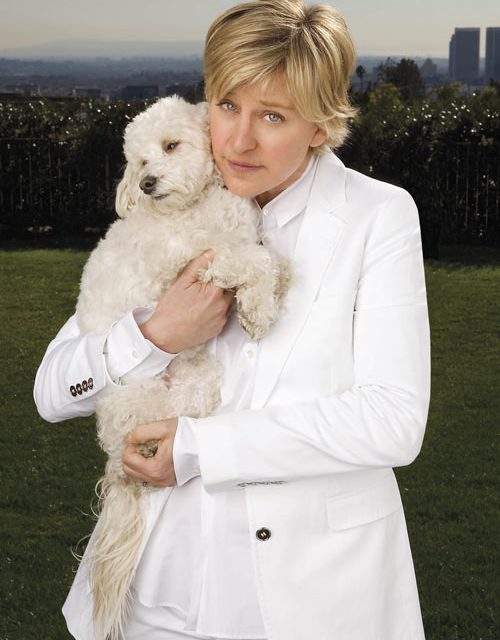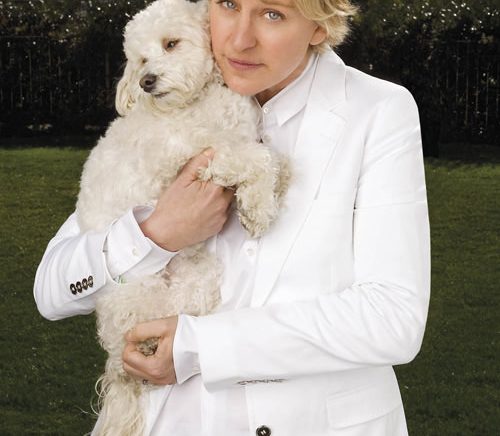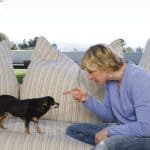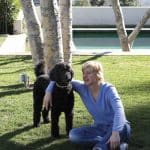

Ellen DeGeneres On Life & Dogs
Ellen talks rescuing coyotes, blazing trails, and mouth-to-mouth on a sparrow
THROUGH MUCH OF THE MID to late nineties, my friends knew not to call me on Wednesday evenings during a particular half hour. For 30 minutes, I had a date with Ellen Morgan, the fictional funny lady brought to life in comedian Ellen DeGeneres’ series Ellen. But my sacred Wednesdays were about more than just channel surfing for a laugh. Wednesdays with Ellen, for me, became something of a young writer’s church. I was learning my first invaluable professional lessons: Comedy can equal kindness. Hollywood can equal humanity.
After multiple episodes of build-up-including innuendo that had Morgan stepping out of her hall closet-the world heard words never before uttered by a leading character on TV: "I’m gay." While supporters cheered, not everyone was in favour of her landmark announcement, and ultimately, in 1998, Ellen Morgan took her final bow.
If the late nineties were about coming out, the new millennium was about coming back. After surviving her own brand of both personal and professional hurdles, a stronger, wiser, more into-her-own Ellen emerged in true phoenix-from-the-ashes style. She shone as host of a post-9/11 Emmy Awards. Her ability to captivate a crowd with a mesmerizing blend of comedy and compassion was a sign of things to come: specifically, the September, 2003, launch of The Ellen DeGeneres Show, which debuted on the heels of her uber-success as the voice of Dory in the Oscar-winning animated hit Finding Nemo. With more prestigious award-show wins to her credit than you can count on your fingers, toes, and elbows, not to mention accolades that include a stellar performance hosting the 79th Academy Awards, here is an Ellen who has found her groove. Both figuratively and literally.
As I pull my car into the lot of NBC’s Studio 11 in Burbank for our noon-time chat about her love for all things animal-esque, the vibe that this is the scene of a heck of a lot of DeGeneres-spawned dancing is palpable. The irony is not lost on me when I am told that today’s taping is for Wednesday’s show. After all, Ellen and I-and Wednesdays-go back a long way.
MD: I don’t want to get too personal, but what’s your favourite line in Salt-n-Pepa’s "Shoop"?
Ellen: I’ll have to sing the whole song…
MD: Feel free.
Ellen: Here I go, here I go, here I go again. Girls, what’s my weakness? Men. Okay then, chillin’, chillin’, mindin’ my business… Yo, Salt, I took a look around and I couldn’t believe this, I swear, I stared, my niece, my witness… I think "My niece, my witness." To rhyme with: "I couldn’t believe this." The brother had it goin’ on with somethin’ kinda – uh – wicked, wicked… I’m not shy so I axed for the digits. And it’s I "axed" for the digits. She "axed" for them.
MD: She took out a sharp object and axed for them.
Ellen: Yeah.
MD: You’ve achieved a lot of firsts. First woman comic to be invited to sit down with Johnny Carson. First openly gay leading role in a sitcom. First show to win the Emmy for Outstanding Talk Show in its first three years. Do you feel comfortable calling yourself a trailblazer?
Ellen: The thing I focus on is my path, and if it somehow impacts other people, good. I don’t do it to be a first. I do it for my challenges. So when I do something, I don’t ever think: Wow, nobody’s done this before! My life is my journey, and mine alone. I either feel good about something, or if I don’t, I know I made a mistake [and I] learn from it.
MD: So the trail you are blazing is your own?
Ellen: Yeah. Which I think we all should be doing. There are so many people that get to the end of their lives and have never fully done what they wanted to because they’re scared. And people get so comfortable with the uncomfortable. No matter how bad their life is, their job is, whatever the situation, they do what it is they think they’re "supposed" to because they’re scared and [anything else] is the unknown. But the unknown is exciting.
MD: Helen Keller said "Life is either a daring adventure, or nothing."
Ellen: Helen Keller was brilliant. Like, look at that. Look at who she was.
MD: In your mom’s book Love, Ellen she talks about how you always had a houseful of rescues. Birds and a chipmunk and a dog called Happy.
Ellen: Ironic in our family. Our family’s dog was named Happy. We had to label something. "No, no. We are happy!"
MD: What is it about animals that always made you gravitate towards helping
them?
Ellen: I cannot imagine not going home to animals. They are the closest thing to God. They don’t harbour resentment. Somebody put it really well: If you hurt a dog, the dog may, years later, remember you hurt him if he sees you. But he’s not going to spend all those years planning how to hurt you the next time he sees you. The compassion I have for animals is from the earliest memories I have. I kept files and copied things out of encyclopedias for what was going to be my office, because I was going to be a veterinarian.
MD: Right. The American Express ad. Your childhood ambition: To work with animals.
Ellen: My entire childhood was spent copying things out of encyclopedias and rescuing. And doing mouth-to-mouth resuscitation on birds that flew into windows.
MD: Did you attempt this?
Ellen: I did. And it actually worked. My father was humiliated. It was at a car dealership. It was a bird that went into the window and everybody just looked at it. I’m a kid and everybody’s going on with just looking at cars and I ran out and grabbed it.
MD: Not true!
Ellen: Yeah. I have a million bird rescue stories. I rescued a hummingbird that had drowned. A hummingbird! Which is the weirdest thing. It was not at all responding. Its eyes were closed. It was just laying in the palm of my hand, soaking wet, and I took it and put its beak from flower to flower, and all of a sudden I saw its tongue come out of its mouth. I couldn’t believe what was happening-to go from being a lump in my hand, to its eyes opening, to literally taking off. It was at a horrible point in my life where I was so depressed and it saved me. I realized that you never know when a hand is going to scoop you up and put you from flower to flower. To me, animals are an amazing example of who we can be and what the connection is. Whether it’s a dog or a cat or….I rescue things I shouldn’t. I almost had a coyote in my car once that I thought was a dog. I almost had it. People were honking at me and it was in the middle of the street and I had the car door open and I was calling it. Everybody was screaming and honking, and I’m like: "You shut up! Why aren’t you saving this dog?!" And then as it got closer, I was like: "I think that’s a coyote."
MD: So what have you got at home now? Dogs, cats, cows…?
Ellen: Portia and I have three cats and two dogs. Wolf is a Maltese-Poodle mix and Mabel is a Standard Poodle.
MD: So you’re a Poodle gal?
Ellen: Well, not necessarily. I’m an anything. If I could, I would have 15 cats and 20 dogs. We have the space and we continue to try to rescue everything we can, which is why we had the whole [Iggy] situation. But I believe in a harmonious dynamic. You don’t force animals to get along. That’s like forcing a roommate to live with you and go "Oh, you’ll get along with that person!"
MD: Have you recovered from the heartache of Iggy?
Ellen: I think I felt like a victim. For me to have been on any kind of attack for an animal issue felt like "This is crazy." I thought I was saving an animal. The way I read it was that if you cannot provide a good home for the animal, it comes back to the shelter. And so I provided a good home. I’ve learned a whole lot. I had no idea it really meant making a phone call and saying "Is this okay?" I’m the most honest person you will ever meet to a fault. I will show you exactly how I feel. I happen to have a talk show. So, I talk about whatever is going on in my life. I had spent all night trying to save this family from losing their dog. It was a dog that I knew was in a good home and I couldn’t just do a show without talking about it. Unfortunately, I wasn’t able to completely contain it and I lost it.
MD: I don’t think that’s unfortunate, Ellen. It was a genuine moment.
Ellen: Well, it was a moment that people aren’t used to seeing on TV.
MD: But this is an industry that needs to learn that seeing something real is lovely.
Ellen: Well, thank you. I mean, believe me. It wasn’t pretty. I didn’t walk away going: "That made me look good."
MD: Crying usually does make people look good though. Bawling especially. I like to look bloated and puffy.
Ellen: Yeah. I like to do that ugly cry, where people can play it over and over again. Anyway, I’ve gotten over it to the extent that I know it was an interesting moment in time that I had to go through for whatever reason. For me, it raised a lot of issues. As long as an animal is protected and safe, that’s the most important thing. There are too many dogs that need homes. Our Standard Poodle was a show dog done with her career, and the guy wanted a better life for her because she was living in a kennel, [so] we got a seven-year old dog that’s fantastic and loves the cats. Then we have Wolf, who is a rescue. We got [him] off the street from a guy who-this is a horrible situation-walks up and down Sunset Boulevard in front of expensive restaurants with puppies, knowing full well someone is going to say "How much?" He smuggles them in from Mexico. Most of them don’t make it.
MD: So are Mabel and Wolf the inspiration behind your decision to buy into Halo, Purely for Pets pet food?
Ellen: You know everybody does different things. A lot of celebrities do perfumes and clothing lines and certainly those things have been offered to me. And I do wear perfume and I do wear clothes….
MD: Oh, you do wear clothes? I wasn’t sure what I was going to find when I came in here.
Ellen: Yes, I do wear clothes. Describe that I am wearing clothes right now.
MD: A bikini and high-cut sneakers.
Ellen: And a tube top. Yup, that’s what I’m being interviewed in. We were approached and this was the dog food I was already using, coincidentally enough.
MD: You were using it or your dogs were?
Ellen: The dogs were using it. We weren’t. But you can eat it if you want to. It’s delicious. We used this dog food and loved it and it was just a beautiful meeting. I’m really excited about it all. It’s just a great quality of food.
MD: Okay, quick gear-shift. Why do so many comedians abandon kindness when they step onto stage?
Ellen: Number one, most comedians, I would say, are angry inside-angry or sad or not dealing with things, and that’s their way of coping. Number two, is just conditioning. Which is why to me it’s so important to show people there is another way to make people laugh. That you don’t have to get a laugh at someone else’s expense. Because it happened to me for a while after I came out, I was more sensitive to it. And it doesn’t feel good. I think it’s a lot smarter and harder to be funny without being mean. It makes you think in a different way.
MD: Recently you did your dance to Kanye West’s "Stronger". (Th-th-that won’t kill me, can only make me stronger.) Do you think that’s a philosophy for you, personally or professionally?
Ellen: I don’t think you have to take that approach to it. I think that everything you attempt makes you stronger. It’s up to us to look at every single thing as a learning experience. It goes back to animals. They wake up in the morning and the first thing they do is stretch. They eat and they exercise and they sleep and they want love and they give love unconditionally and they don’t judge you. They are just pure love. They require all that we require. But we try to push it. We act like if we don’t have this and don’t have that. They don’t look at another dog and go: Look at the ass on that dog, I should have an ass like that.
MD: They just sniff it.
Ellen: Exactly, they just sniff it. Which is what we should do. That’s my point. Finally, we’re getting to the point of this interview. If we would just sniff one another’s butts….
MD: Next elevator ride, just lean in to whoever is there for a quick sniff.
Ellen: Yup, and then pee right against the corner of the wall. A life to me with animals watching them and being with them, is all I need. I don’t care about getting any stronger. I just care about being a good person and a kind person and trying to help animals have a voice. One thing I want to do at some point in my life is try to make the laws a lot harsher for people who abuse animals. I just want to love animals and be around them all the time.
MD: And if that means rescuing a coyote and giving a hummingbird mouth-to- mouth, all the better.
Ellen: No, it wasn’t the hummingbird I gave mouth-to-mouth to. Don’t mix your birds. Someone is going to read this and try to give a hummingbird mouth-to- mouth and scrape the roof of their mouth. I never said give a hummingbird mouth-to-mouth. Don’t make me look crazy. It’s a sparrow that you give mouth-to-mouth to. ■
Join the newsletter and never miss out on dog content again!
"*" indicates required fields
By clicking the arrow, you agree to our web Terms of Use and Privacy & Cookie Policy. Easy unsubscribe links are provided in every email.


